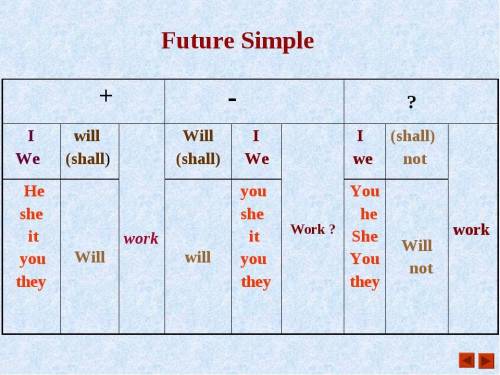1. She washed her hands and face.
2 We invited Liz to stay with us in our house.
3. - Do you know that man ?- Yes, I know him
4. That is his book . Give it to him.
5. Peter likes to eat. His breakfast is always big.
6. This bag is heavy. What is there in it?
7. Look at them ! They are playing football .
8. Are you a teacher?- No, I am not.
9. They live in the country . It isn't big but it is comfortable.
10. Jeans always stay in fashion . People like them
11. She is mad about her car. She spends hours washing it .
12. - Can I help you ? -Yes, please . What do you want? I would like a pair of shoes.
Время Future Simple ссылается на действие, которое совершится в неопределенном или отдаленном будущем.
д ля того, чтобы поставить глагол во временную форму Future Simple, нужно использовать его начальную форму и вс глагол will. В устной речи will чаще всего сокращается до формы ‘ll, которая может использоваться во всех лицах. Однако, в современном английском, особенно в устной речи, will стал использоваться для всех лиц:
Примечание:
Ранее при употреблении будущего времени для первого лица (I, we) было принято использовать вс глагол shall:
Объяснение:

V. Заполните пробелы глаголами to be, to have, to do, обращая внимание на их функции. Предложения переведите на русский язык
1) They are to become the basis for the solution of a great number of problems.
2) Chemistry is of great importance for modern industry.
3) He has much work to do yesterday.
4) They have no car.
5) He has/does work as much as you do.
6) What is done cannot be undone.